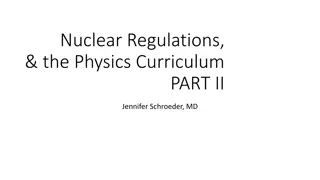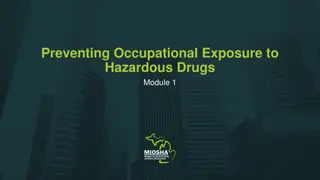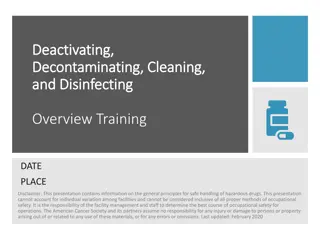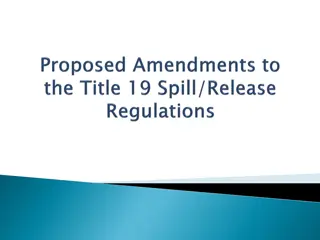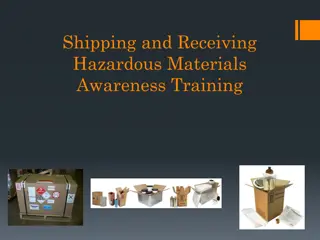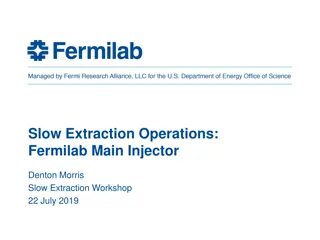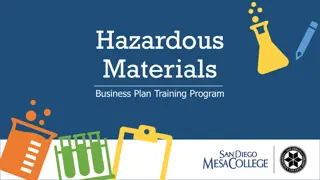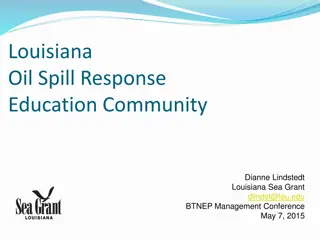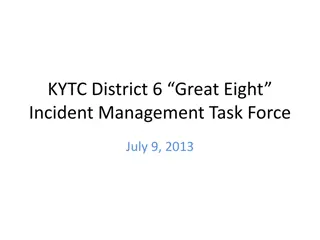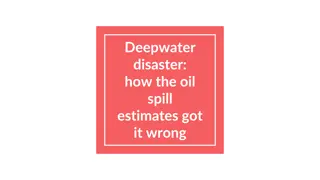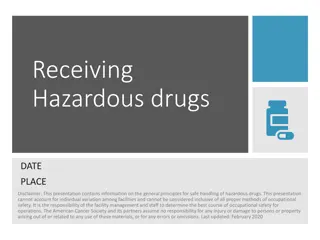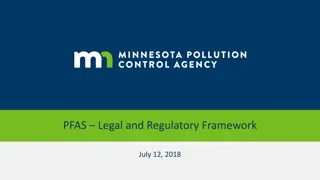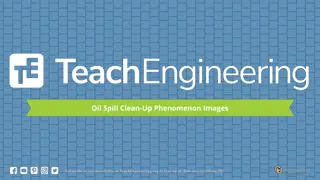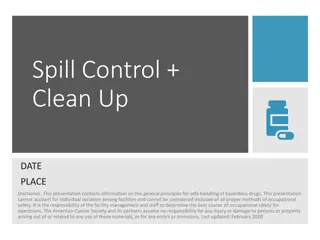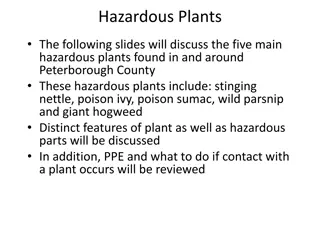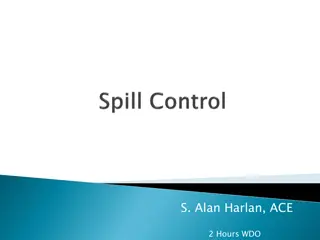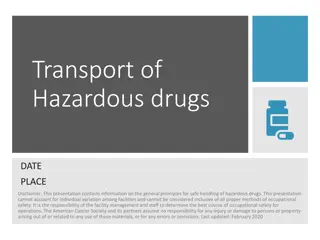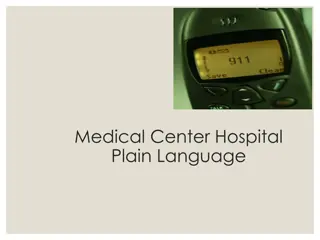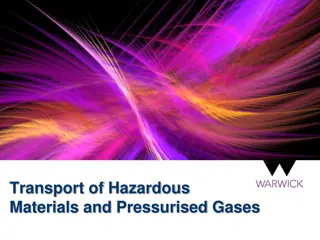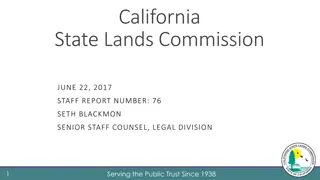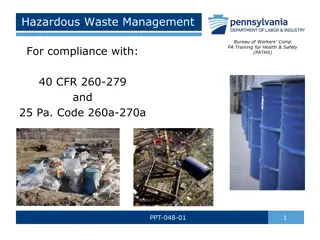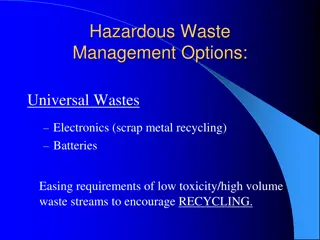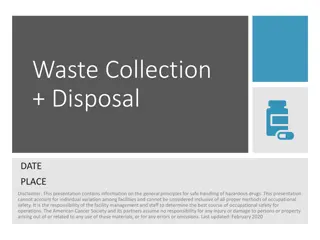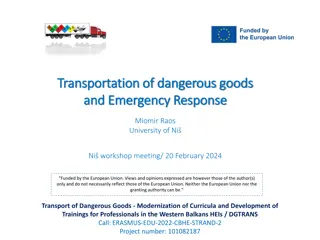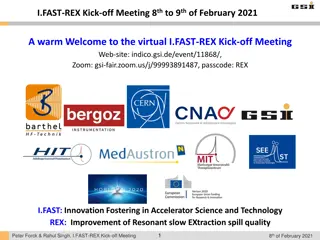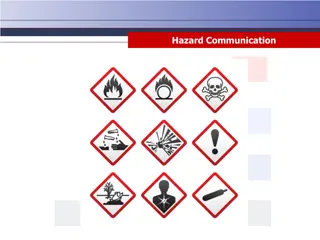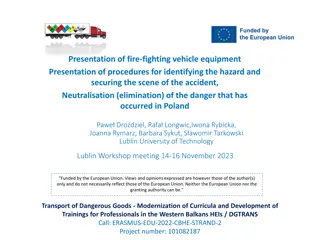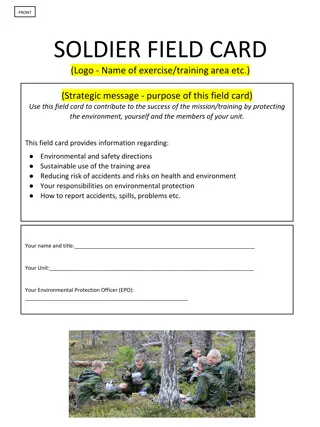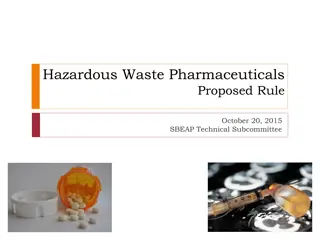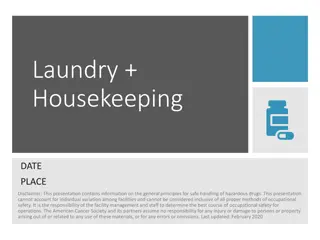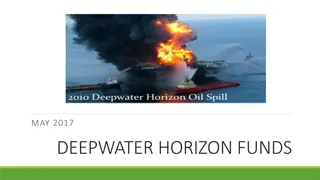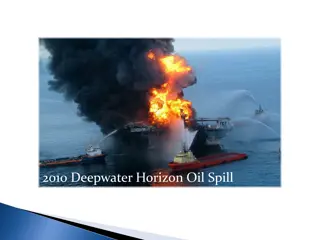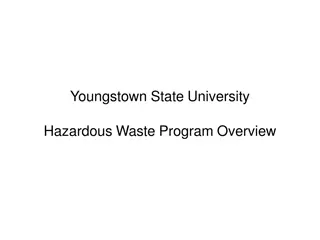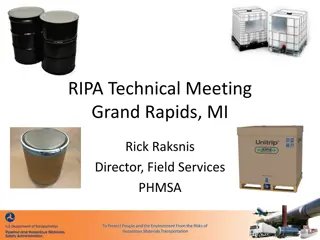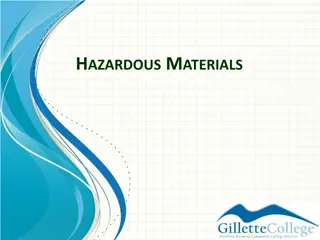Understanding Polarity and Oil Spill Impacts
Explore the concept of polarity in molecules and its impact on interactions, learn about the environmental effects of oil spills, and understand methods used for oil spill cleanup. Discover how polar and nonpolar molecules behave differently and the challenges posed by oil spills on wildlife and eco
2 views • 13 slides
Best Practices for Handling Radioactive Spills in Nuclear Medicine Facilities
Understanding the guidelines for dealing with radioactive spills is crucial in nuclear medicine. This comprehensive guide covers major and minor spill scenarios, steps to take in case of a spill, and special considerations for radioactive gas spills. Learn how to ensure safety, prevent contamination
1 views • 34 slides
Emergency Services Unit and Hazardous Materials Management in Louisiana
The Emergency Services Unit (ESU) in Louisiana, along with Hazardous Materials management, focuses on preparing, preventing, responding, recovering, and mitigating hazardous incidents. Their goals include public safety through education, training, enforcement, and support of regulations at the state
5 views • 35 slides
PP Jumbo Bags in Hazardous Material Handling
In industries dealing with hazardous materials, safety is paramount. From chemical manufacturing to waste management, proper containment and transportation of hazardous substances are critical to prevent accidents, protect workers, and comply with regulations. This is where PP jumbo bag step in as i
4 views • 5 slides
Occupational Exposure to Hazardous Drugs: Risks and Prevention
Learn about the hazards of exposure to hazardous drugs, including potential health risks such as cancer, nausea, reproductive toxicity, and organ damage. Explore training modules, drug categories, and a list of hazardous drugs to ensure workplace safety. Discover NIOSH criteria for identifying hazar
1 views • 42 slides
Hazardous Drug Cleaning and Decontamination Training Overview
This presentation provides an overview of training on deactivating, decontaminating, cleaning, and disinfecting hazardous drug areas. It covers essential steps, personal protective equipment, materials, timing, and validation criteria. All areas handling hazardous drugs must undergo deactivation, de
0 views • 23 slides
Proposed Amendments for Hazardous Material Release Reporting Regulations
Amendments to the hazardous material release reporting regulations include consolidating definitions, adding new definitions, changing the administering agency, updating citations, and altering notification timeframes. The amendments aim to enhance emergency response and improve reporting procedures
1 views • 18 slides
Hazardous Materials Awareness Training Overview
This training module provides essential information on shipping and receiving hazardous materials, including definitions, objectives, levels of training required, shipping regulations, and penalties for non-compliance. It covers the importance of training, regulatory guidelines, and the potential co
0 views • 21 slides
Slow Extraction Operations at Fermilab Main Injector
Overview of slow extraction operations at Fermilab Main Injector, covering beam transport, low to medium energy user test beams, Drell-Yan experimental beam, and spill procedures. Details on beam targets, production, and observation of high-energy positrons. Also, insights on spill regulation techni
0 views • 12 slides
Hazardous Materials Business Plan Training Program
Facilities subject to the Hazardous Materials Business Plan (HMBP) Program must implement a training program for employees on hazardous materials safety and emergency response. This includes initial training for new employees within 30 days of hire and annual refresher training. Training covers safe
1 views • 73 slides
Louisiana Oil Spill Response Education Efforts
Collaborative educational efforts in Louisiana focused on oil spill response, engaging teachers, informal educators, and science professionals. Initiatives involved conducting workshops, developing lesson plans, and addressing key topics of interest like coastal habitats, wildlife impacts, and spill
0 views • 26 slides
KYTC District 6 Great Eight Incident Management Task Force Meeting Recap
Recap of the KYTC District 6 Great Eight Incident Management Task Force meeting held on July 9, 2013. The meeting covered incident reviews including a truck fire and fuel spill in Harrison County, responsibilities for debris removal after a truck/camper crash in Carroll County, a two semi crash in G
0 views • 44 slides
Analyzing Deepwater Disaster: Inaccurate Oil Spill Estimates
Explore the Deepwater Horizon disaster, where oil spill estimates were inaccurate due to various factors such as convoluted discharges, technological limitations, and reluctance to share data. Consequences of underestimation and reasons behind flawed estimates are discussed, shedding light on the ch
0 views • 13 slides
Safe Handling of Hazardous Drugs: Training and Protocols
This presentation provides guidelines for the safe handling of hazardous drugs during receipt and unpacking. It covers topics such as personal protective equipment, inspecting packages for damage, and proper unpacking procedures. Staff involved in medication handling from suppliers should undergo th
0 views • 16 slides
Overview of PFAS Legal and Regulatory Framework
This document outlines the legal and regulatory framework surrounding PFAS (per- and polyfluoroalkyl substances), including hazardous waste designation, historical context at 3M sites, and the definition of hazardous substances and waste according to Minnesota statutes. It also discusses the potenti
0 views • 19 slides
Exploring Oil Spill Clean-Up: Images Showcase the Phenomenon
Delve into the imagery depicting the clean-up process of an oil spill, showcasing various stages and methods used. Each image prompts viewers to observe closely and ponder the techniques and challenges involved in addressing such environmental disasters.
0 views • 6 slides
Hazardous Drugs Spill Control and Clean-Up Guidelines
Learn about safe handling of hazardous drugs through spill control and clean-up procedures. This presentation covers identifying spills, using spill kits, cleaning spills, reporting, and documentation. Proper training and procedures are essential to protect personnel from exposure risks. Always foll
0 views • 27 slides
Hazardous Plants Identification and Safety Guide
Explore the five main hazardous plants found in and around Peterborough County, including stinging nettle, poison ivy, poison sumac, wild parsnip, and giant hogweed. Learn about their distinct features, hazardous parts, symptoms of contact, and safety precautions. Discover how to identify these plan
0 views • 4 slides
Spill Control and Cleanup Procedures for Chemical Incidents
Learn the essential steps to control and clean up spills from chemical incidents, starting with turning off the engine and using absorbent materials to contain and remove the spill safely. Proper disposal of the contaminated materials is crucial, and communication with relevant parties is key in han
0 views • 31 slides
Safe Handling of Hazardous Drugs: Training Overview
This presentation provides essential information on safe handling practices for transporting hazardous drugs within healthcare facilities. It covers training modules, types of transport activities, personal protective equipment requirements, packaging guidelines, and safety criteria for labeling and
0 views • 17 slides
Ripple Mitigation Strategies for Spill Micro-Structure in Particle Physics
This document discusses strategies for mitigating ripples in spill micro-structures in particle accelerators, focusing on a quad-driven slow extraction mechanism. It outlines potential solutions and improvements in micro-structure, along with results and recommendations from beam time experiments. T
0 views • 9 slides
Emergency Response Procedures at Medical Center Hospital
Medical Center Hospital has established protocols for various emergency situations such as evacuation, fire, hazardous spills, and medical emergencies. Each department has specific evacuation plans, and authorized personnel can order evacuations. Staff are trained on fire alarm activation, hazardous
0 views • 17 slides
Understanding Hazardous Materials Transportation Regulations
Legislation governs the transportation of hazardous materials, including strict rules for packaging and transport. Dangerous goods are classified into nine categories, each with specific hazards. Consignors must identify, label, and package goods properly to prevent risks. Biological materials requi
0 views • 9 slides
California State Lands Commission Staff Report Summary
California State Lands Commission's staff report discusses the history and operations of Platform Holly and PRC 421. Platform Holly, installed in 1966, ceased production in 2015 due to an oil spill event, and Venoco LLC later notified the Commission of its inability to meet lease obligations. Pier 4
0 views • 13 slides
Hazardous Waste Management Regulations in Pennsylvania
The hazardous waste management regulations in Pennsylvania outline compliance standards for handling hazardous waste, including storage, identification, transportation, recordkeeping, and emergency response. These regulations incorporate both federal guidelines under RCRA and state-specific requirem
0 views • 122 slides
Effective Hazardous Waste Management Strategies for Electronics and Batteries
Implementing proper waste management strategies for electronics and batteries is crucial to promote recycling and prevent environmental harm. The policy outlines procedures for disposing of electronic waste, including the collection of usable equipment for surplus handling. Additionally, it emphasiz
0 views • 9 slides
Proper Handling and Disposal of Hazardous Drugs and Waste
Guidelines for the safe handling and disposal of hazardous drugs and waste in healthcare facilities. The content covers training modules, waste collection, sources of healthcare waste, disposal methods, and legal regulations related to the disposal of hazardous drugs. Various types of healthcare was
0 views • 21 slides
Modernization of Curricula for Transportation of Hazardous Materials and Emergency Response Workshop
This workshop, funded by the European Union, focuses on modernizing curricula and developing training programs for professionals in the Western Balkans HEIs on the transportation of dangerous goods and emergency response. Various methods of transporting hazardous materials, such as cargo tanks, chem
0 views • 35 slides
I-FAST-REX Project Overview
I-FAST-REX is a collaborative project focusing on advancing accelerator science and technology through various work packages and tasks. The project spans over four years with an EU contribution of 10 million Euros, targeting improvements in beam quality, spill control, power supply stability, and RF
0 views • 6 slides
Importance of Hazard Communication Training for Workplace Safety
Hazard communication training is essential for creating a safe work environment by helping individuals recognize and manage hazardous materials effectively. Understanding the Globally Harmonized System (GHS) and following hazard communication laws can improve workplace safety, protect human health,
0 views • 36 slides
Proper Procedures for Dealing with Hazardous Substance Spills
This presentation covers the procedures for identifying and securing hazards at the scene of an accident, as well as neutralizing dangers in Poland. It includes information on fire-fighting vehicle equipment, such as different nozzles and tools used by the fire brigade. Steps for dealing with hazard
0 views • 7 slides
Ensuring Chemical Reporting and Preparedness at the DEQ
The Chemical Reporting and Preparedness section at the DEQ focuses on regulations under EPCRA, prompted by incidents like the Bhopal tragedy. EPCRA covers Tier II reporting, spill reporting, LEPCs, State Emergency Response Commission, and Oklahoma Hazardous Materials Emergency Response Commission. T
0 views • 17 slides
Environmental Protection Field Card for Soldiers - Protecting Nature and Unit During Missions
This environmental protection field card serves as a guide for soldiers to contribute to mission success by safeguarding the environment, themselves, and unit members. It includes instructions on spill response, spill prevention, natural and cultural protection, and vehicle movement to minimize risk
0 views • 10 slides
Hazardous Waste Pharmaceuticals Proposed Rule Overview
This briefing provides an in-depth look at the Hazardous Waste Pharmaceuticals Proposed Rule from October 20, 2015. It covers which pharmaceuticals are considered hazardous waste, major provisions of the proposal, examples of listed hazardous waste pharmaceuticals, and the flow of hazardous waste ph
0 views • 40 slides
Occupational Safety Training in Handling Hazardous Drugs
This presentation provides guidelines and training modules for staff responsible for cleaning areas where hazardous drugs are handled, including laundry and housekeeping tasks. Topics cover personal protective equipment recommendations, cleaning procedures, disposal processes, and hygiene practices.
0 views • 18 slides
Deepwater Horizon Funding and Restoration Efforts in Texas
Texas has access to various funding sources as a result of the Deepwater Horizon Oil Spill, including the Resources & Ecosystems Sustainability, Tourist Opportunities & Revived Economies of the Gulf Coast States Act of 2012 (RESTORE), Gulf Environmental Benefit Fund, National Fish & Wildlife Foundat
0 views • 23 slides
Management of Funds from the 2010 Deepwater Horizon Oil Spill in Texas
Texas has access to funds from the Deepwater Horizon Oil Spill through the Gulf Environmental Benefit Fund, Natural Resource Damage Assessment, and the RESTORE Act. The National Fish and Wildlife Foundation allocates funds for Texas projects, while BP provides funding for early restoration projects.
0 views • 33 slides
Youngstown State University Hazardous Waste Program Overview
The Hazardous Waste Program at Youngstown State University follows a cradle-to-grave approach, encompassing laws, regulations, inspections, roles, and responsibilities related to hazardous waste management. It delves into the identification, labeling, disposal, and transportation of hazardous waste,
0 views • 18 slides
RIPA Technical Meeting Grand Rapids, MI
The Pipeline and Hazardous Materials Safety Administration's (PHMSA) strategic framework emphasizes innovation and safety in transportation of energy and hazardous materials. Goals include cultivating excellence, building trust, and pursuing operational excellence. Initiatives such as IBC repair tes
0 views • 11 slides
Safe Transportation of Hazardous Materials: A Comprehensive Guide
This comprehensive guide explores the safe transportation of hazardous materials, covering topics such as requirements for hazmat drivers, classifications of hazardous materials, handling procedures, placarding, and regulatory compliance. Learn about identifying, packaging, labeling, and transportin
0 views • 31 slides

